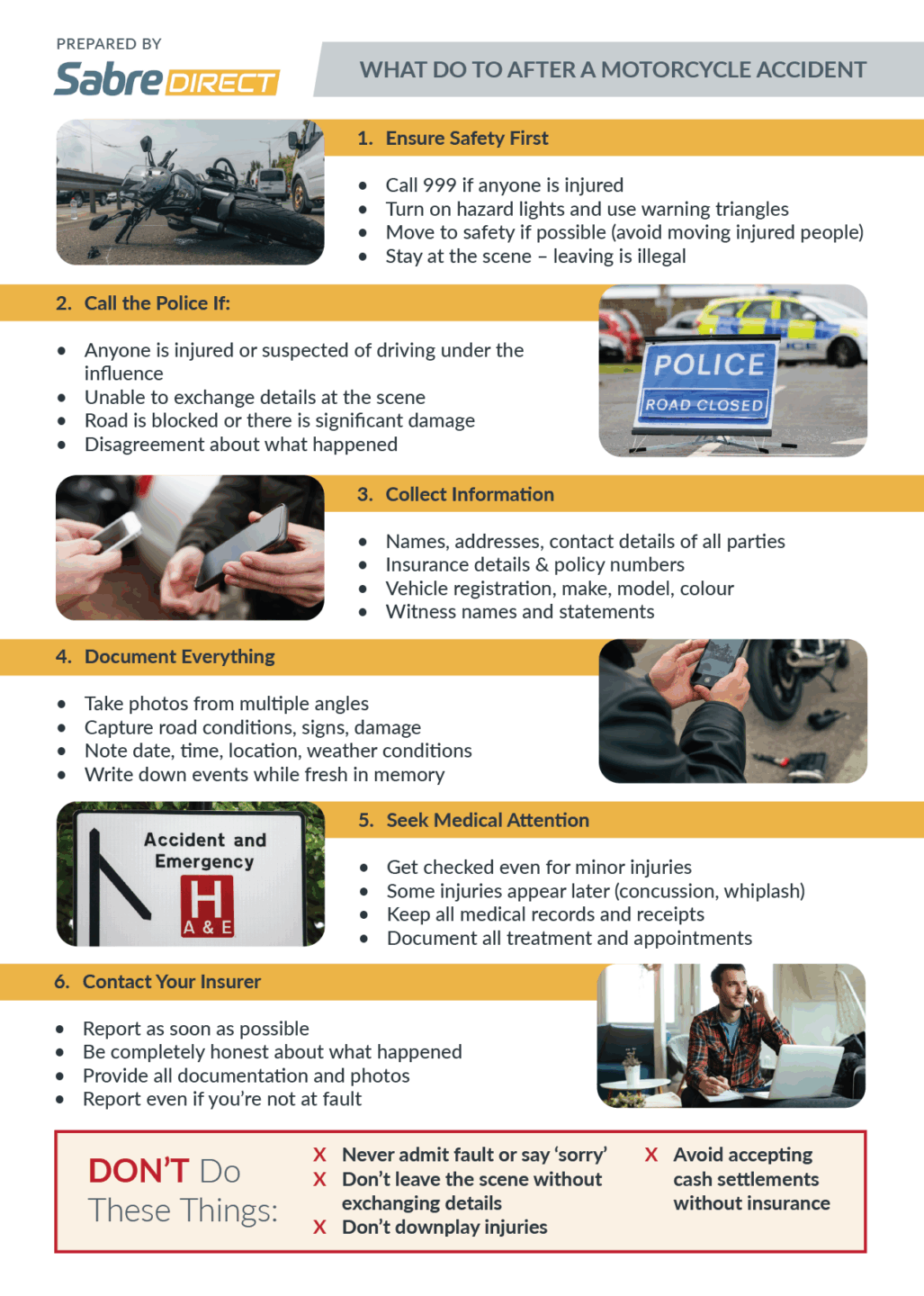Being involved in a motorcycle accident can be traumatic and overwhelming. Knowing what steps to take immediately after a motorcycle accident can protect your safety, legal rights, and insurance claims. Here’s your complete guide to handling the aftermath of a motorcycle accident.
Immediate Steps at the Scene
Your safety and that of others is the top priority after any motorcycle accident. Call 999 immediately if anyone is seriously injured. If you can move safely, check on other parties involved and move to safety if possible, but if anyone involved is suspected of having a spinal injury it is important that they don’t move.
Make the scene safe by turning on hazard lights, placing warning triangles if available, and moving vehicles out of traffic only if it’s safe to and the pose as a danger to other road users.
Do not leave the scene of the accident as this is illegal under UK law.
When to Call Police After a Motorcycle Accident
You must report the accident to the police if you aren’t able to exchange details at the scene, if anyone is injured, if there’s significant damage to property, the road is blocked, you suspect the other driver is under the influence, or there’s a disagreement about what happened.
Even for minor motorcycle accidents, reporting to police can be helpful for insurance claims and provides official documentation of the incident.
Essential Information to Collect
Collect details from all parties involved in the motorcycle accident. This includes:
- full names
- addresses
- contact details
- insurance companies
- policy numbers
- driving licence numbers
- vehicle registration numbers and make, model, and colour of vehicles involved
If witnesses are present, obtain their names and contact details along with brief statements about what they observed. Witnesses can be crucial for disputed claims, especially in complex motorcycle accident scenarios.
Record important facts about the motorcycle accident including date, time, exact location, weather and road conditions, speed limits and traffic signs, direction each vehicle was travelling, and a clear description of what happened.
Documenting the Motorcycle Accident Scene
If it’s safe to do so, photograph: all vehicles involved in the accident from multiple angles, any damage to property, the accident scene including road conditions, relevant street signs, traffic lights and road markings.
Write down your recollection of events while they’re fresh in your memory, what the other party said about the motorcycle accident, any admissions of fault, and details about emergency services that may have attended the scene.
What NOT to Do After a Motorcycle Accident
Never admit fault even if you think you might be partially responsible. Stick to factual statements about what happened and let insurance companies and investigators determine fault. Avoid saying “sorry” as this can be interpreted as admission of guilt.
As previously mentioned, leaving the scene of a motor accident is illegal and can result in criminal charges, driving bans, invalidated insurance claims, and increased penalties if injuries are involved.
Be cautious if the other party offers to pay for damage without involving insurance. Hidden damage may be more extensive than initially apparent, and you may have injuries that don’t manifest immediately after the accident.
Medical Attention After a Motorcycle Accident
Seek medical help even for seemingly minor injuries. Motorcycle accident injuries can include concussion and head injuries that aren’t immediately apparent, whiplash and neck injuries, internal injuries, and shock that masks pain initially.
Keep detailed medical records of all treatment including A&E visits, GP consultations, specialist appointments, physiotherapy sessions, and all prescriptions and medical reports. This documentation will be crucial for any personal injury claims following your motorcycle accident.
Contacting Your Insurance After a Motorcycle Accident
Contact your insurer as soon as possible after any motorcycle accident. Report the incident even if you don’t think you’re at fault, be completely honest about what happened. Your insurer will take you through the claims process and ask you for relevant information including details of all parties involved, police incident number if applicable, photos and documentation you collected, and any witness statements obtained at the scene.
Motorcycle accidents can happen to even the most careful riders. The key is being prepared and knowing how to respond if the worst happens.
Ensure You’re Properly Covered – Don’t wait until after a motorcycle accident to discover gaps in your insurance cover. Review your motorcycle insurance today and make sure you’re properly protected. Get a comprehensive quote now.


 My Account
My Account